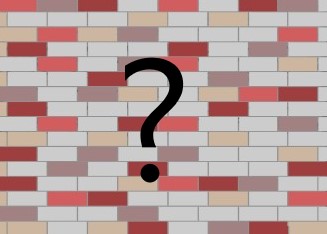Questions to Ask Yourself Before Declaring a "Brick Wall"
Before you decide you have a "brick wall" in your genealogy research, there are some questions you can ask

If you think your genealogy research has hit a "brick wall", it may be helpful to ask yourself the following questions:
Have I carefully checked the location where my ancestor was supposed to live?
Most of the claimed "brick wall" issues turn out to be situations where the researchers are looking in the wrong place or have yet to identify the place. Whenever someone comes to me with a question, I immediately examine where and when the event they are looking for supposedly occurred. It is no longer surprising to me to find out that they have been looking in the wrong place all along. Usually, it is a jurisdictional issue with the county or the city being different than the one they have identified in their passed-down records. I use the Newberry Atlas of Historical County Boundaries and other mapping programs, to start to verify the county boundaries at the time of the supposed event.
What do I know about the specific ancestor's family, especially children and grandchildren?
Sometimes people claim that they have hit a brick wall when all they really have hit is one brick. Constant attention directed at the missing person is unproductive. You already know that person is hard to find, so try someone else: brothers, sisters, neighbors, children, or grandchildren. You need to learn as much as you can about the entire family and any records that may have survived from family or neighbors.
Have I looked in the newspapers?
The number of online digital newspaper collections increases daily and there are many newspapers you can search. There are hundreds of invidivual sites that have digital newspapers. See our newspaper directory to more easily find the digital newspapers where your ancestor lived.
Have I read about the history of the place?
Check your local library or historical society for suggestions or go online and search in WorldCat.org for the location plus the words genealogy or history. You might find your ancestor's family in the book or not, but you will come away with a greater appreciation for the area where they lived and just might get some good ideas about where to look.
Have I looked at all of the possible record sources?
See our article about genealogy record types for new ideas of records you may not have tried yet.
Written by James L. Tanner. Used with permission.
Need help finding more records? We have genealogy research services available. You can also try our genealogical records directory which has more than 1.3 million sources to help you more easily locate the available records.
Related Topics on This Site
- Learning Genealogy Articles more than 140 helpful articles to help you to do genealogy more effectively
- Finding an Elusive Ancestor Ideas for finding a missing ancestor in your genealogy who is difficult to locate
- Find a Missing Ancestor by Searching for the Children If you are stuck on an ancestral line in your genealogy, more information on that person's children may help
- When It Is Time to Quit Searching for an Elusive Ancestor How you know you have done a reasonably exhaustive search
- Burned Courthouses and Lost Records What to do if you find out that the genealogy records to locate your family burned in a fire